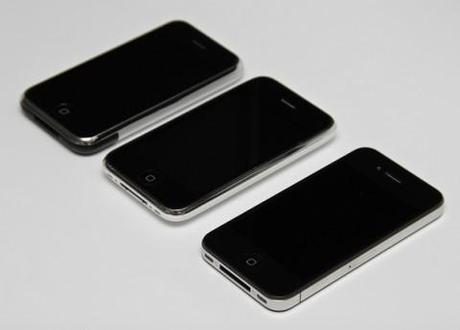
Spot the Difference. iPhone original, 3G & 4. Photo credit: Yutaka Tsutano http://www.flickr.com/photos/ivyfield/4731067396/
When the iPhone 4S was announced last week it was received with resounding cries of disappointment. Apple fans wanted an iPhone 5, and the 4S was a “stumble” from Apple. Since then, the first day of pre-orders for the phone have exceeded one million, and the new model is selling faster than any Apple product before. So why is the phone that was deemed insufficiently revolutionary being so enthusiastically snapped up?
A wider audience. Sales of the iPhone 4S have exceeded those of the iPhone 4 a year ago, but are the figures comparable? When the iPhone 4 was released, 600,000 handsets were sold in the first day, but the launch of the phone was only in select countries – Australia and Canada couldn’t order the phone until a month later. This time around, the Associated Press reported, the phone is on offer globally, so comparing consumer demand for this product with that for previous versions is not straightforward. Apple has also expanded the number of networks that are licenced to sell the phone, meaning a wider potential pool of customers.
It’s because it’s awesome. Despite appearances, the new model represents big changes. With a faster processor, improved web browsing and a ream of functional improvements, in addition to the new Siri software, this phone is a significant evolution of the older iPhones. Pete Cashmore, CEO of Mashable and writing for CNN, was smitten with Siri. “She’s right about everything,” he cooed. Many others agree that the phone is a dramatic improvement on previous versions, and it’s this leap in quality that’s driving sales.
Steve Jobs’ (un)timely death. Some say the death of Steve Jobs has spurred the buying public into investing in the new phone. Jija Jacob of the International Business Times asked “Are loyal fans shoring up Job’s Apple dream and proclaiming the cult-like trust in the iProducts at a time of grief?” The Huffington Post reported, “marketing experts say products designed by widely admired figures like Jobs usually see an upsurge in sales after their death.”
A smart strategy. Christina Bonnington of Wired claimed that the sales success “validates Apple’s strategy.” She quoted analyst Charles Golvin: “It reinforces [Apple's] belief in their strategy, building the products that they think make the most sense.”

